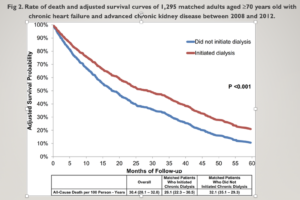Kaiser Permanente study highlights need for more research on best treatments for people managing both conditions
For older people with chronic kidney disease and heart failure, initiating dialysis only slightly extends survival, new research suggests. This finding can help physicians, patients, and their family members make an informed, shared decision on whether to initiate dialysis or choose conservative management.

“Many older people with heart failure and advanced chronic kidney disease currently receive dialysis,” said lead author Sijie Zheng, MD, PhD, a nephrologist with The Permanente Medical Group. “But as our study showed, an older patient with advanced chronic kidney disease who also has heart failure has a very poor prognosis. This study is one step toward helping us produce all the information we need to help these patients decide whether to choose dialysis.”
More than half of all people who have heart failure also have chronic kidney disease. “Chronic kidney disease puts stress on the heart, increasing risk for heart failure and other types of heart disease,” said senior author Alan S. Go, MD, a senior research scientist at the Kaiser Permanente Northern California Division of Research. “In turn, people with heart failure are at risk for kidney disease because they share many risk factors. When someone has both diseases, it’s a challenging situation to manage.”

The study, published in PLOS One, included 1,295 adults aged 70 and older being treated for both heart failure and chronic kidney disease between 2008 and 2012 at Kaiser Permanente Northern California. The patients were followed through December 2013.
To create the study group, the researchers identified 348 patients with heart failure and chronic kidney disease who started dialysis. They then identified a second group of 947 carefully matched patients who received conservative management for their kidney disease. Conservative management incorporates medical care that helps patients maintain their kidney function for as long as possible, manage health problems caused by kidney failure, and sustain their quality of life.
By the end of the study, 156 (45%) of the patients who received dialysis had died compared to 472 (50%) of those who chose conservative management. The researchers also looked at where the patients died. They found that 53% of the patients who started dialysis died in the hospital compared to 26% of the patients who selected conservative management. The patients who received dialysis were also less likely to receive palliative care.
“The absolute death rates were very high in both groups,” said Zheng. “This underscores the poor prognosis of people with both conditions. It also raises questions for physicians like me on how best to provide patient-centered care.”
This study is one step toward helping us produce all the information we need to help these patients decide whether to choose dialysis.
— Sijie Zheng, MD, PhD
Dialysis is a procedure that partially replaces kidney function in people with advanced kidney disease by filtering waste and water from the blood. The procedure takes about 3 to 4 hours and is usually done 3 times per week. Because it significantly condenses the time the kidneys need to remove waster and waste — from 168 hours per week to 9-12 hours per week — it can cause many symptoms and side effects, such as blood pressure changes, fatigue, and depression.
 “People start dialysis because they hope it will help them to live longer,” said Go. “But exactly how much longer can be very different for each patient. Dialysis can also result in a loss of independence and can negatively impact a person’s quality of life. For people who also have heart failure, these factors may make the decision about whether to choose dialysis or conservative management more complicated.”
“People start dialysis because they hope it will help them to live longer,” said Go. “But exactly how much longer can be very different for each patient. Dialysis can also result in a loss of independence and can negatively impact a person’s quality of life. For people who also have heart failure, these factors may make the decision about whether to choose dialysis or conservative management more complicated.”
The researchers said the findings show why more research is necessary. “We need to have a randomized controlled trial that compares the risks and benefits of conservative management of chronic kidney disease to dialysis to definitively answer that question,” said Zheng.
Funding for this study was provided by the National Institute of Diabetes and Digestive and Kidney Diseases, the National Heart, Lung and Blood Institute, and Kaiser Permanente Northern California Community Benefit Fund.
Co-authors include Jingrong Yang, MA, Thida C. Tan, MPH, and Susan S. Kim, BS, from the Division of Research; and Sharina Belani, MD, David Law, MD, and Leonid V. Pravoverov, MD, of The Permanente Medical Group.
# # #
About the Kaiser Permanente Division of Research
The Kaiser Permanente Division of Research conducts, publishes and disseminates epidemiologic and health services research to improve the health and medical care of Kaiser Permanente members and society at large. It seeks to understand the determinants of illness and well-being, and to improve the quality and cost-effectiveness of health care. Currently, DOR’s 600-plus staff is working on more than 450 epidemiological and health services research projects. For more information, visit divisionofresearch.kaiserpermanente.org or follow us @KPDOR.





This Post Has 0 Comments